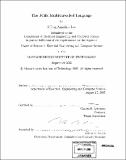The JCilk multithreaded language
Author(s)
Lee, I-Ting Angelina
DownloadFull printable version (5.586Mb)
Other Contributors
Massachusetts Institute of Technology. Dept. of Electrical Engineering and Computer Science.
Advisor
Charles E. Leiserson.
Terms of use
Metadata
Show full item recordAbstract
JCilk is a Java-based multithreaded programming language which extends Java to provide a dynamic threading model. Specifically, JCilk imports Cilk's fork-join primitives spawn and sync into Java to provide procedure-call semantics for concurrent subcomputations. More importantly, JCilk integrates exception handling with multi-threading by defining semantics consistent with Java's existing semantics of exception handling. JCilk's strategy of integrating multithreading with Java's exception semantics yields some surprising semantic synergies. In particular, JCilk extends Java's exception semantics to allow exceptions to be passed from a spawned method to its parent in a natural way that obviates the need for Cilk's inlet and abort constructs. This extension is "faithful" in that it obeys Java's ordinary serial semantics when executed on a single processor. When executed in parallel, however, an exception thrown by a JCilk computation signals its sibling computations to abort, yielding a clean semantics in which only a single exception from the enclosing try block is handled. To minimize the complexity of reasoning about aborts, JCilk signals them "semisynchronously" so that abort signals do not interrupt ordinary serial code. Because JCilk uses Java's normal exception mechanism to propagate an abort throughout a subcomputation, the programmer can handle clean-up by simply catching a thrown CilkAbort exception. This thesis documents in detail the designed semantics, the linguistic decisions we made, and their justifications. This thesis also describes the structure of JCilk compiler and how it supports the exception semantics. (cont.) Specifically, the JCilk compiler performs a two-stage compilation process to support the continuation mechanism required by the runtime system's work-stealing algorithm. By performing static analysis, the compiler generates code to support the "catchlet" and "finallet" mechanisms for handling exceptions. The design of JCilk represents joint research with John S. Danaher and Charles E. Leiserson.
Description
Thesis (S.M.)--Massachusetts Institute of Technology, Dept. of Electrical Engineering and Computer Science, 2005. Includes bibliographical references (p. 103-107).
Date issued
2005Department
Massachusetts Institute of Technology. Department of Electrical Engineering and Computer SciencePublisher
Massachusetts Institute of Technology
Keywords
Electrical Engineering and Computer Science.